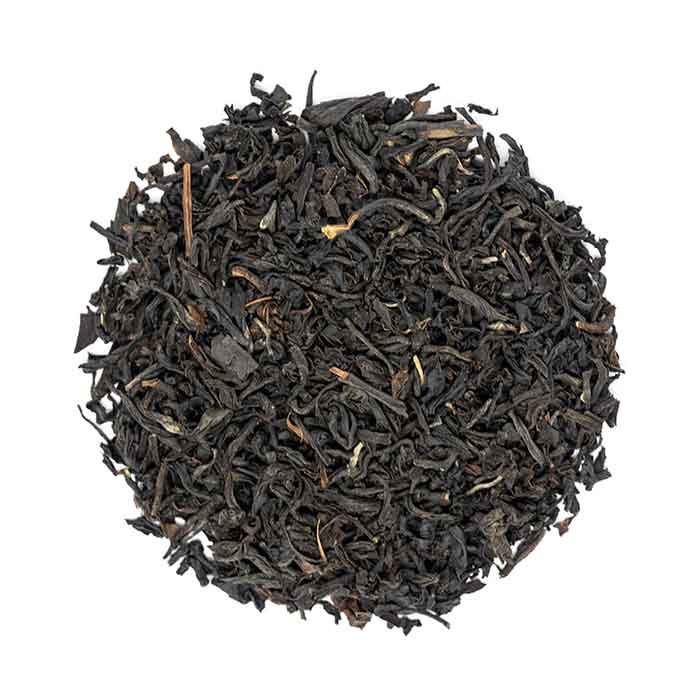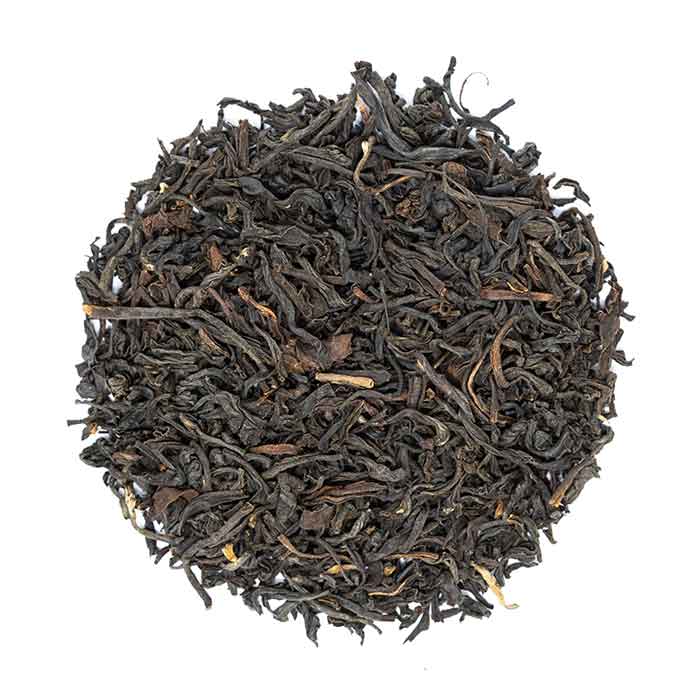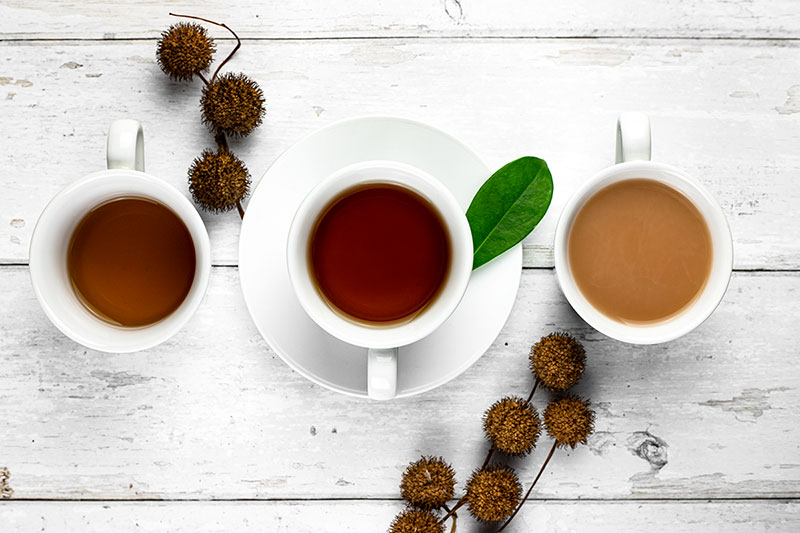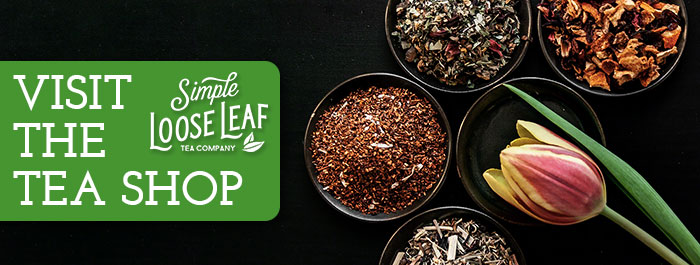What is Assam Black Tea?
Assam is a home to thousands of tea gardens that produce thousands of exquisite loose leaf teas with hundreds of flavors. Until recently, Assam was usually marketed simply as Indian tea, but today, both tea garden and quality grade are important for tea drinkers around the world. If you drink tea, there is a chance you have tried Assam at least once in your life. It’s a common ingredient in many blends – from English Breakfast to Earl Grey.
What is Assam tea?
Assam tea is black tea made in the Assam region in India. Until recently, Assam was producing almost only mass market black tea. Despite its popularity and wide availability, Assam is a relatively new tea. Tea production in India started only about 200 years ago.
What makes Assam tea different from other black types of tea is:
- Assam tea is made from Camellia sinensis var assamica, a plant native to Assam
- Unique terroir
- Processing methods
This region produced about 50% of the total Indian tea, making it the largest tea industry in India and the biggest tea growing region in the world[1]. It has about 50 000 tea producers that make almost 49 000 thousands kilogram of tea[2] per year. Some of them are a bigger plantations that produce mass market teas, while others are small tea gardens focused on artisan and specialty tea. Small gardens are the reason why today, Assam tea is getting much more appreciation and respect. Until recently, most of the tea from Assam was used in blends, usually in tea bags.
With the popularity of loose leaf tea, Assam got a chance to show the full beauty and versatility of its native tea plant. Today, it’s possible to buy amazing white, oolong or green tea made in this region too, often high prized and unique. But most importantly, a black tea got a chance it deserved.
Two types of Assam tea
Assam is usually harvested four times per year, with the first and second harvest being the best. Unlike Darjeeling, it’s a low grown tea, and fully oxidized. Two main types are available – orthodox and CTC tea. Orthodox Assam tea can further be divided into many categories, depending on the leaf type. Orthodox tea is made using traditional methods and are considered of higher quality than tea made for tea bags. However, that is not always the case, as the final quality will depend on many factors – soil, climate, plant, leaf type, harvesting time, processing methods and much more.

Organic Assam orthodox tea
CTC or cut-tear-curl tea is a type of black tea where leaves are formed into a small little pellets, like in Simple Chai tea. CTC is not used for making other types, such as green, white, oolong, pu’erh or yellow tea.
What does Assam tea taste like?
Assam tea is usually described as full bodied and strong with a malty flavor. Full bodied means that tea is rich and complex and is most often related to black tea. Assam tea is a common ingredient in tea blends, used to give a stronger base and depth. The flavor can range from brisk, smokey, earthy, musky and strong to a lighter cup with chocolate, cocoa, or even sweet and spicy notes.
CTC Assam tea will usually be stronger, sharper, maltier and maybe astringent. This type of tea is usually found in tea bags, rather than in loose leaf form. However, it makes a wonderful base for chai teas, or for teas that need to be strong to hold the aroma of spices, milk and sugar.

Organic Assam black tea from Hathikuli tea plantation
Caffeine content
Assam black tea is usually considered having the high caffeine content out of all black types of tea. However, not all Assam tea will have a lot of caffeine. Caffeine levels will depend on the type of plant, type of tea leaves, grade, harvesting time and brewing method. Broken Assam dust in tea bags may have more than double the amount of caffeine than loose leaf tea. Assam’s strong flavor and caffeine content is the reason why it’s a popular choice for breakfast teas.
Study on caffeine content in Indian teas showed that Assam unbroken loose leaf tea has the lowest caffeine levels of all Indian black teas. However, both Assam orange pekoe and Assam CTC showed the highest amounts[3], more than Darjeeling or other Indian black teas.
5 benefits of drinking Assam tea
Drinking Assam tea may provide many health benefits. The top 5 are:
-
Strengthening the immune system
A cup of Assam tea may help strengthen the immune system. Black tea contains antioxidants that are beneficial for the overall health[4]. Studies showed that Assam loose leaf black tea has a higher antioxidant activity than Darjeeling tea[5]. It also contains the highest levels of calcium, iron, magnesium and copper. Thus, to enjoy the most benefits of black tea, loose leaf Assam may be a much better choice than tea in tea bags.
-
Promoting weight loss
Black tea polyphenols may be beneficial for weight loss and they are very unlikely to have side effects. Studies showed that drinking black tea may reduce a calorie intake, enhance the process of turning fat into energy, and decrease fat accumulation[6].
-
Anticancer property
Drinking black tea may help reduce the risk of some types of cancer,[7] specifically, skin, lung and breast cancer[8]. Although the anti-cancer properties of black tea have not been as researched as those of green tea, evidence so far shows a great potential og black tea polyphenols of preventing and potentially treating some cancers.
-
Lowering blood sugar
Black tea may be beneficial for people with type 2 diabetes as it may help lower blood sugar levels and „improve the status of insulin.[9]“ A statistical study showed the correlation between drinking black tea and lower diabetes cases. The study included data form 50 countries.
-
Protecting against neurodegenerative diseases
Black tea may not only influence the brain in terms of increased alertness and focus, it may offer protection against diseases related to aging too. Studies showed that drinking 3 cups of black tea per day may lower the risk of Parkinson’s disease[10] and Alzheimer’s disease[11].
How to brew Assam tea
Unlike Chinese tea, Assam is always best brewed only once. However, some loose leaf Assam tea may give three or more delicious infusions. The best way to brew Assam is by using freshly boiled spring water. Water temperature should be around 205- 210°F. One teaspoon of broken tea leaves is enough to make one cup of tea. However, if you are using unbroken leaves, use a regular spoon instead. Steep for 2-3 minutes. CTC teas will steep quicker and 1-2 minutes will be enough for a strong full cup.
And finally, if you want the strongest cup with the most caffeine and robust brisk flavor, choose Assam CTC or orange pekoe black tea. If you want the most benefits and lighter cup, opt for unbroken loose leaf tea.
Disclaimer: This article is for informational purposes only. It’s not intended to replace medical advice, diagnosis or treatment. Every person is different and may react to different herbs and teas differently. Never use teas or herbs to treat serious medical conditions on your own. Always seek professional medical advice before choosing home remedies.
References:
[1] http://www.teaboard.gov.in/TEABOARDCSM/Ng==
[2] https://des.assam.gov.in/portlets/industrial-statistics
[3] https://www.ncbi.nlm.nih.gov/pmc/articles/PMC5380613/
[4] https://www.ncbi.nlm.nih.gov/pmc/articles/PMC6512146/
[5] https://www.ncbi.nlm.nih.gov/pmc/articles/PMC5380613/
[6] https://www.ncbi.nlm.nih.gov/pmc/articles/PMC6273558/
[7] https://www.ncbi.nlm.nih.gov/pmc/articles/PMC6512146/
[8] https://www.ncbi.nlm.nih.gov/pmc/articles/PMC4055352/
[9] https://www.ncbi.nlm.nih.gov/pmc/articles/PMC6512146/
[10] https://www.ncbi.nlm.nih.gov/pmc/articles/PMC4055352/
[11] https://www.health.harvard.edu/alzheimers-and-dementia/regular-tea-drinking-linked-with-dementia-prevention




